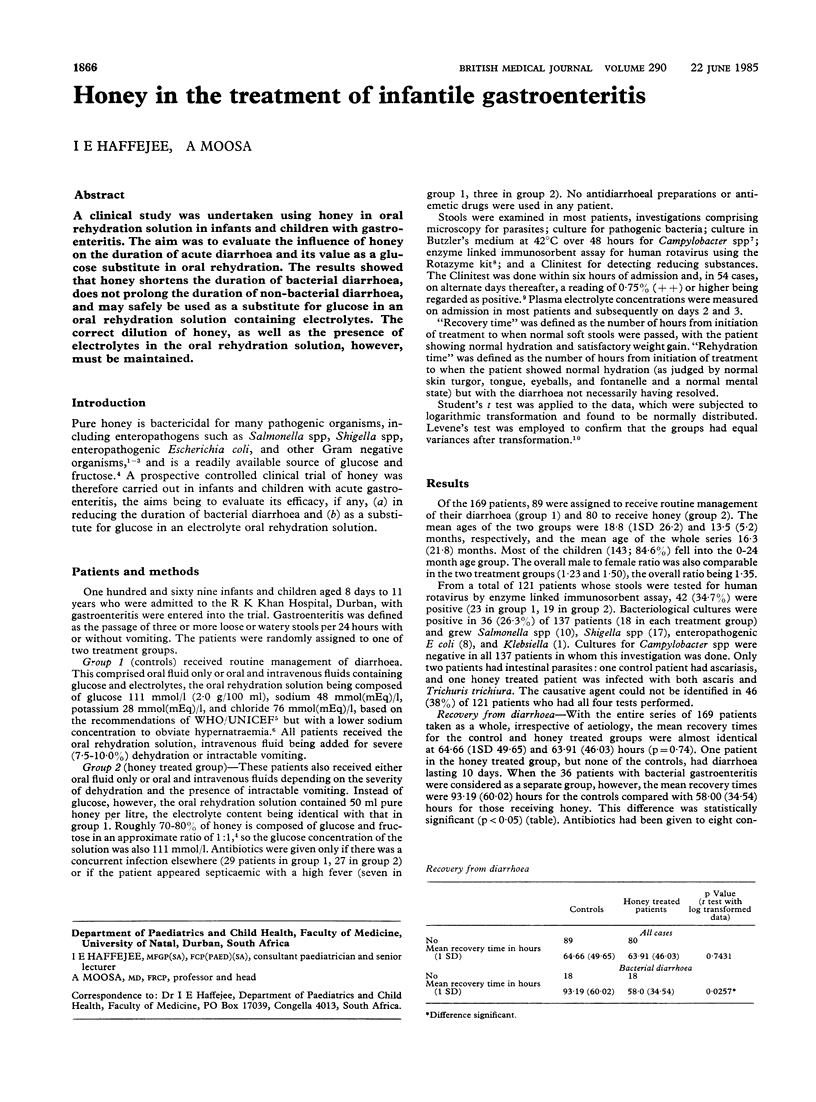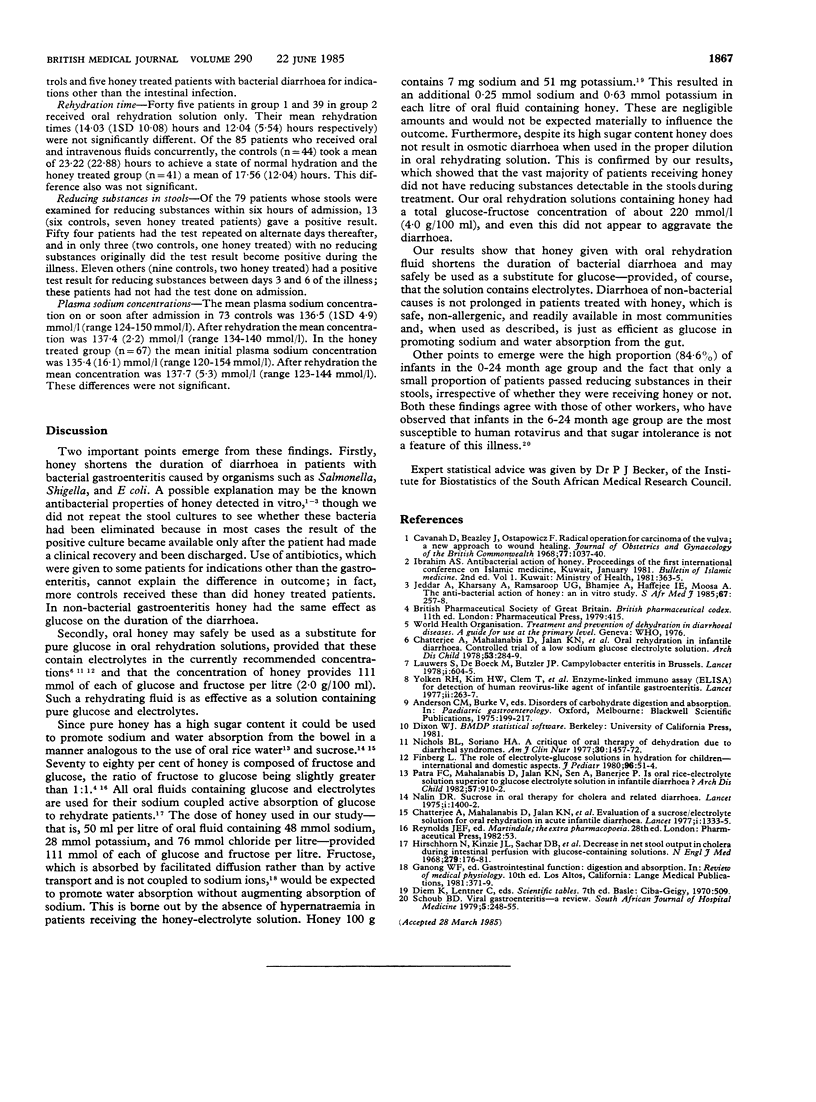Abstract
A clinical study was undertaken using honey in oral rehydration solution in infants and children with gastroenteritis. The aim was to evaluate the influence of honey on the duration of acute diarrhoea and its value as a glucose substitute in oral rehydration. The results showed that honey shortens the duration of bacterial diarrhoea, does not prolong the duration of non-bacterial diarrhoea, and may safely be used as a substitute for glucose in an oral rehydration solution containing electrolytes. The correct dilution of honey, as well as the presence of electrolytes in the oral rehydration solution, however, must be maintained.
Full text
PDF

Selected References
These references are in PubMed. This may not be the complete list of references from this article.
- Cavanagh D., Beazley J., Ostapowicz F. Radical operation for carcinoma of the vulva. A new approach to wound healing. J Obstet Gynaecol Br Commonw. 1970 Nov;77(11):1037–1040. doi: 10.1111/j.1471-0528.1970.tb03455.x. [DOI] [PubMed] [Google Scholar]
- Chatterjee A., Mahalanabis D., Jalan K. N., Maitra T. K., Agarwal S. K., Bagchi D. K., Indra S. Evaluation of a sucrose/electrolyte solution for oral rehydration in acute infantile diarrhoea. Lancet. 1977 Jun 25;1(8026):1333–1335. doi: 10.1016/s0140-6736(77)92550-8. [DOI] [PubMed] [Google Scholar]
- Chatterjee A., Mahalanabis D., Jalan K. N., Maitra T. K., Agarwal S. K., Dutta B., Khatua S. P., Bagchi D. K. Oral rehydration in infantile diarrhoea. Controlled trial of a low sodium glucose electrolyte solution. Arch Dis Child. 1978 Apr;53(4):284–289. doi: 10.1136/adc.53.4.284. [DOI] [PMC free article] [PubMed] [Google Scholar]
- Finberg L. The role of oral electrolyte-glucose solutions in hydration for children--international and domestic aspects. J Pediatr. 1980 Jan;96(1):51–54. doi: 10.1016/s0022-3476(80)80323-4. [DOI] [PubMed] [Google Scholar]
- Hirschhorn N., Kinzie J. L., Sachar D. B., Northrup R. S., Taylor J. O., Ahmad S. Z., Phillips R. A. Decrease in net stool output in cholera during intestinal perfusion with glucose-containing solutions. N Engl J Med. 1968 Jul 25;279(4):176–181. doi: 10.1056/NEJM196807252790402. [DOI] [PubMed] [Google Scholar]
- Jeddar A., Kharsany A., Ramsaroop U. G., Bhamjee A., Haffejee I. E., Moosa A. The antibacterial action of honey. An in vitro study. S Afr Med J. 1985 Feb 16;67(7):257–258. [PubMed] [Google Scholar]
- Lauwers S., De Boeck M., Butzler J. P. Campylobacter enteritis in Brussels. Lancet. 1978 Mar 18;1(8064):604–605. doi: 10.1016/s0140-6736(78)91045-0. [DOI] [PubMed] [Google Scholar]
- Nalin D. R. Sucrose in oral therapy for cholera and related diarrhoeas. Lancet. 1975 Jun 28;1(7922):1400–1402. doi: 10.1016/s0140-6736(75)92607-0. [DOI] [PubMed] [Google Scholar]
- Nichols B. L., Soriano H. A. A critique of oral therapy of dehydration due to diarrheal syndromes. Am J Clin Nutr. 1977 Sep;30(9):1457–1472. doi: 10.1093/ajcn/30.9.1457. [DOI] [PubMed] [Google Scholar]
- Patra F. C., Mahalanabis D., Jalan K. N., Sen A., Banerjee P. Is oral rice electrolyte solution superior to glucose electrolyte solution in infantile diarrhoea? Arch Dis Child. 1982 Dec;57(12):910–912. doi: 10.1136/adc.57.12.910. [DOI] [PMC free article] [PubMed] [Google Scholar]
- Yolken R. H., Kim H. W., Clem T., Wyatt R. G., Kalica A. R., Chanock R. M., Kapikian A. Z. Enzyme-linked immunosorbent assay (ELISA) for detection of human reovirus-like agent of infantile gastroenteritis. Lancet. 1977 Aug 6;2(8032):263–267. doi: 10.1016/s0140-6736(77)90951-5. [DOI] [PubMed] [Google Scholar]


